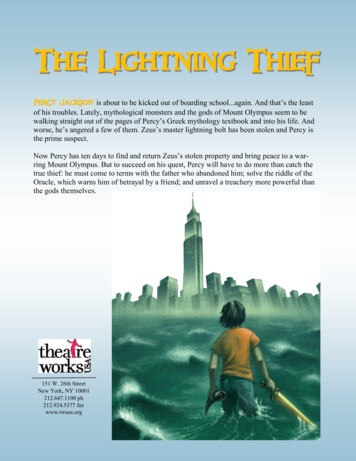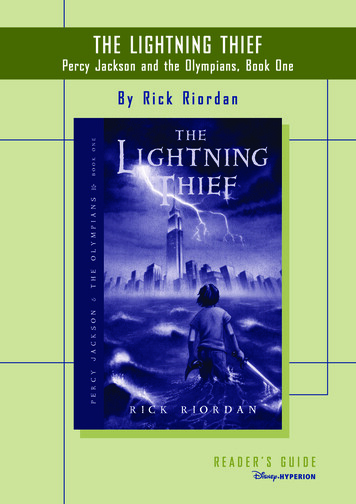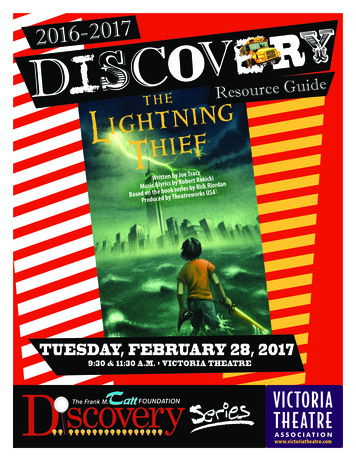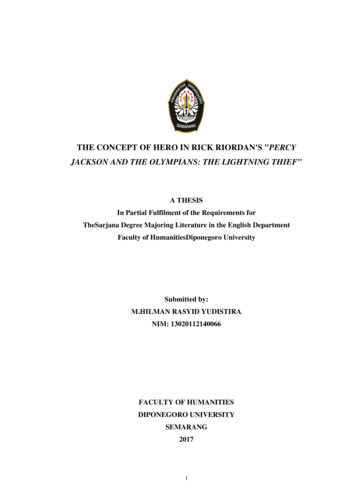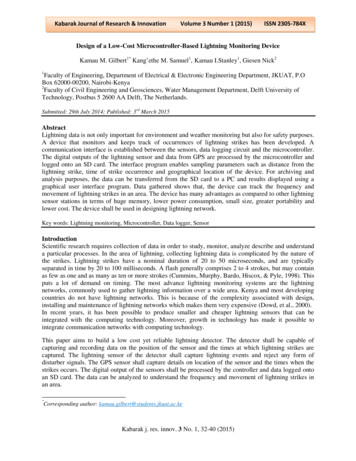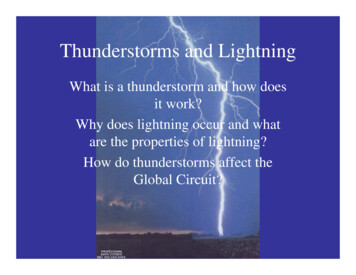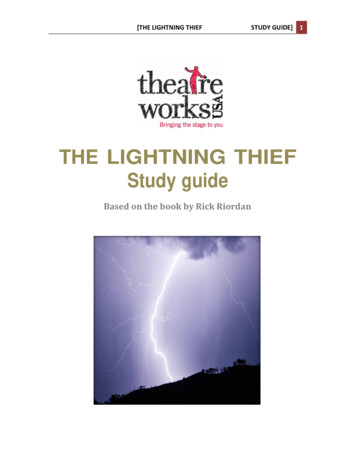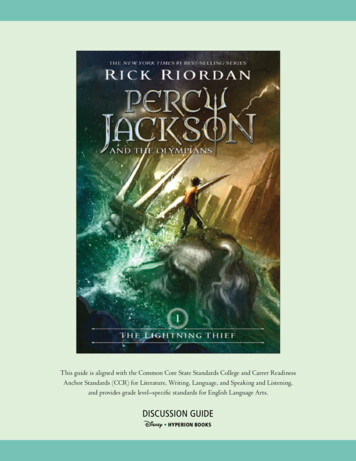
Transcription
This guide is aligned with the Common Core State Standards College and Career ReadinessAnchor Standards (CCR) for Literature, Writing, Language, and Speaking and Listening,and provides grade level–specific standards for English Language Arts.DISCUSSION GUIDEDisney HYPERION BOOKS1
About the BookWhen twelve-year-old Percy Jackson learns that his true father is Poseidon, the Greekgod of the sea, he undertakes a dangerous quest across the United States to retrieve astolen lightning bolt and stop a war between the gods. The Lightning Thief provides a highinterest, humorous introduction to the Greek myths. It encourages young readers toexplore elements of the classical hero’s quest rendered in a modern-day setting, and todiscuss such relevant issues as learning disabilities, the nature of family, and themes ofloyalty, friendship, and faith.Discussion QuestionsAs they discuss the following questions, encourage students to refer to specific passages from the book.1 Percysays, “Mr. Brunner expected me to be as good as everybody else, despite the fact I have dyslexia andattention deficit disorder and I had never made above a C– in my life. No—he didn’t expect me to be as good.He expected me to be better.” What do you think of Mr. Brunner as a teacher?2 Whendescribing his mother, Percy says, “She’s the best person in the world, which just proves my theorythat the best people have the rottenest luck.” How does this apply to Percy’s mom? Is this theory true in life?In the Greek myths?3 Percygets exasperated with his mother because she puts up with Smelly Gabe, yet he is proud of her because“she did have a rebellious streak, like me.” Do you find Sally Jackson a strong character? Does she stand up forherself? For her son?4 Percy’sfirst encounter with an Olympian god is Mr. D, Dionysus. Initially, Percy has a hard time believing thatMr. D is immortal. What is your reaction to the way Dionysus is portrayed in the book? The Greek gods havevery human traits—would this make them easier or harder to believe in?5 Annabethis the daughter of Athena, the goddess of wisdom and warfare. Look at some of the myths aboutAthena, including the stories of Arachne, Medusa, and the founding of Athens. How is Annabeth like hermother? Does anything about Annabeth’s character strike you as unlike Athena?6 AfterPercy learns he is a half-blood, he wonders who his own father is. He also learns that some half-bloodsnever find out. He says, “I thought about some of the kids I’d seen in the Hermes cabin—teenagers who lookedsullen and depressed, as if they were waiting for a call that would never come. I’d known kids like that at YancyAcademy, shuffled off to boarding school by rich parents who didn’t have the time to deal with them. But godsshould behave better.” How would you feel if you were in Percy’s place? Would it be easier to believe yourfather was dead, or to know that he was alive but not communicating with you?2
7 WhenPercy finally learns the truth, that he is the son of Poseidon, are you surprised? What hints are droppedbefore the revelation? How does Percy’s personality fit, and not fit, the god Poseidon?8 TheLotus Casino in Las Vegas is a modern-day version of the land of the Lotus Eaters, which Odysseusvisited on his way back from Troy. Read the original version from The Odyssey. How do the two accounts differ?Is the danger Odysseus faced similar to the danger faced by Percy and his friends? Is society todaymore dominated by “Lotus Eaters”?9 Howdoes the last line of the prophecy—you shall fail to save what matters most, in the end—come true? What do youthink of this ending? Did Percy make the right choice? What would you have done in his place? Correlates to Common Core State Standards for English Language Arts in Reading Literature: Key Ideas and Details, R.L.5.1–8.1,R.L.5.2–8.2, and R.L.5.3–8.3; Speaking and Listening: Comprehension and Collaboration, S.L.5.1–8.1; and Language: VocabularyAcquisition and Use, L.7.5.A.3
Classroom Activities1 TheGods of Olympus. Before reading the book, have students write down things they know about Greekmythology. Once they’re done, have them work with a partner to compare notes. This works well as a timedactivity. Make it a competition to see who can get the most, with their partner, in two to five minutes. Stressthat it is okay to be wrong on this activity—students are simply trying to jog their memory as much as possible.2 Pickan Immortal Parent. Remind students that the gods frequently had children with mortals. Ask them toresearch which god or goddess they would most like to be related to. For ideas, visit www.theoi.com. Studentsshould write down their top three choices and explain each one.3 TheBattle with the Titans. Read an account of the Titanomachy, the war between the gods and Titans, froma Greek mythology book or website. Compare this to the version Percy gives Mr. Brunner in chapter 1. Make alist of any differences between the two versions. Make a list of details Percy forgot to include.4 CharacterCollage. This activity can either be done on paper or with digital tools. Ask students to make a listof characters they’ve met in the book so far. These include: Percy, Grover, Nancy Bobofit, Mrs. Dodds, Mr.Brunner, Smelly Gabe, and Sally Jackson. Have them search and cut out (or copy on a computer) photos ofpeople that they think are close to how these characters would appear. Paste these onto a large piece of a paper(or into PowerPoint, iMovie, or another digital program). Students should then label each character and finda quote about them from the book—either a description of the character or something they said. This lineshould be written underneath each character’s picture. This activity is good for keeping the characters straightand can be a lot of fun when students start comparing their visualizations of the different characters.5 Makea Graphic. A graphic is an illustrated representation of one chapter. You can do this on regularprinter paper, or larger art paper. It can be done individually or with a partner. A graphic has thefollowing components:a. A picture in the middle that is a symbol for the chapter. It can be an important object mentioned in thechapter—the bus, for instance, or a pair of scissors.b. A t least three colors used to color the object. Each color has to represent something, and you must write whyyou chose that color. For instance, “Red stands for Percy’s anger at being expelled.”c. O n each corner of the page, pick a quote from the chapter and copy it. The quote can be any one-to-twoline section that you think is significant or tells something revealing about one of the characters. After eachquote, explain in a sentence what it means and why you picked it.d. Put the title of the chapter and your name at the top. Once students learn how to do a graphic, it can be easily used with any chapter or short story in the future.4
A Sample Graphic (this is for chapter one; yours will be for another chapter)Graphic for “I Accidently Vaporize My Pre-algebra Teacher”By I. B. StudentQuote 3Quote 4Brown standsfor the nastyfeeling of havingsomebody throwfood at youWhite stands forGrover’s fear ofMrs. DoddRed stands for Percy’s anger at NancyI told Grover I didn’t think Mrs. Dodds washuman. He looked at me real serious and said,“You’re absolutely right.”Quote 2I chose this quote because it foreshadowswhat will happen to Dodds.Correlates to Common Core State Standards for English Language Arts in Reading Literature: Key Ideas and Details, R.L.5.1–8.1,R.L.5.4–8.4, R.L.8.9; Speaking and Listening: Comprehension and Collaboration, S.L.5.1–8.1, and Presentation of Knowledge and Ideas,S.L.5.4–8.4, S.L.5.5–8.5; and Writing: Research to Build and Present Knowledge, W.5–8.9.5
Rick Riordan (www.rickriordan.com) is the author of the New York Times #1 best-sellingseries Percy Jackson and the Olympians, the Kane Chronicles, and the Heroes of Olympus.Before he became a full-time author, Rick spent fifteen years as a classroom teacher inpublic and private schools in California and Texas.A Talk with Rick RiordanWhere did you get the idea for Percy Jackson? My son was studying the Greek myths in second grade when he asked me to tell him some bedtime storiesabout the gods and heroes. I had taught Greek myths for many years at the middle school level, so I was glad todo it. When I ran out of myths, he was disappointed and asked me if I could make up something new with thesame characters. Off the top of my head, I made up Percy Jackson and his quest to recover Zeus’s lightning bolt inmodern-day America. It took about three nights to tell the whole story, and when I was done, my son told me Ishould write it out as a book.12 Youwere a teacher for a long time. Why did you leave the classroom? That was a hard decision. I love teaching. I love working with kids. After I finished the first Percy Jacksonbook, I didn’t think I’d be able to keep writing a book a year and do a good job in the classroom, so I made thereluctant decision to leave teaching. The good part is I still get to work with kids as a children’s author.Hopefully, I’ll be able to get even more kids interested in reading Greek mythology.3 Didyou share the Percy Jackson novel with any of your students before it was published? My nine-year-old son was the first one to hear to story, but I also wanted to be sure it would interest olderkids. I picked a few of my sixth, seventh, and eighth graders and asked them if they’d be willing to “test drive”the novel. I was nervous! I’m used to showing my work to adults, but I had no idea if kids would like Percy. Ifinally understood what it must be like for them, turning in an essay to me and waiting to get their grades back!Fortunately for me, the kids loved the book.4 Anyadvice for young people who might want to be writers? Don’t be afraid to ask for help! Find a teacher you respect. Correspond with authors. You will find thata polite e-mail will almost always get a response. Secondly, read a lot! Read everything you can get your hands on. You will learn the craft of writing byimmersing yourself in the voices, styles, and structures of writers who have gone before you. Thirdly, write every day! Keep a journal. Jot down interesting stories you heard. Write descriptions of peopleyou see. It doesn’t really matter what you write, but you must keep up practice. Writing is like a sport — youonly get better if you practice. If you don’t keep at it, the writing muscles atrophy. Finally, don’t get discouraged! Rejection is a part of writing, and it hurts. The trick is to keep at it. Wallpaperyour room with rejection notes, if you want, but don’t give up.6Michael FrostAbout the Author
Books by R ick R iordanP ercy Jacksonand theThe K ane ChroniclesOlympi ansBOOK ONEBOOK TWOBOOK THREEBOOK FOURBOOK FIVEBOOK ONEBOOK TWOThe LightningThiefThe Sea ofMonstersThe Titan’sCurseThe Battleof the LabyrinthThe LastOlympianThe Red PyramidThe Throneof FireHardcover978-0-7868-5629-9 17.99Paperback978-0-7868-3865-3 7.99Hardcover978-0-7868-5686-2 17.99Paperback978-1-4231-0334-9 7.99Hardcover978-1-4231-0145-1 17.99Paperback978-1-4231-0148-2 7.99Hardcover978-1-4231-0146-8 17.99Paperback978-1-4231-0149-9 7.99Hardcover978-1-4231-0147-5 17.99Paperback978-1-4231-0150-5 7.99Percy Jackson’sGreek HeroesPercy Jackson’sGreek GodsHardcover978-1-4231-8365-5 24.99Hardcover978-1-4231-8364-8 24.99BOOK ONEBOOK TWOBOOK THREEThe LightningThiefThe Sea ofMonstersThe Titan’sCurseThe Graphic NovelThe Graphic NovelThe Graphic NovelHardcover978-1-4231-1696-7 19.99Paperback978-1-4231-1710-0 12.99Hardcover978-1-4231-4529-5 19.99Paperback978-1-4231-4550-9 12.99Hardcover978-1-4231-4530-1 19.99Paperback978-1-4231-4551-6 12.99COMINGSOON!Hardcover978-1-4231-1338-6 17.99Paperback978-1-4231-1345-4 9.99Hardcover978-1-4231-4056-6 18.99Paperback978-1-4231-4201-0 9.99BOOK THREEBOOK ONEThe Serpent’sShadowThe Red PyramidHardcover978-1-4231-4057-3 19.99Paperback978-1-4231-4202-7 9.99Hardcover978-1-4231-5068-8 21.99Paperback978-1-4231-5069-5 12.99The Heroes of OlympusThe Graphic NovelNew Series!COMINGSOON!BOOK ONEBOOK TWOBOOK THREEBOOK FOURBOOK FIVEBOOK ONEBOOK ONEThe Lost HeroThe Son ofNeptuneThe Mark ofAthenaThe House ofHadesThe Blood ofOlympusThe Lost HeroHardcover978-1-4231-4059-7 19.99Paperback978-1-4231-4199-0 9.99Hardcover978-1-4231-4060-3 19.99Paperback978-1-4231-4200-3 9.99Hardcover978-1-4231-4672-8 19.99Paperback978-1-4231-4677-3 9.99Hardcover978-1-4231-4673-5 19.99Magnus Chase andthe Gods of AsgardThe Sword ofSummerHardcover978-1-4231-1339-3 19.99Paperback978-1-4231-1346-1 9.99The Graphic NovelHardcover978-1-4231-6279-7 21.99Paperback978-1-4231-6325-1 12.99Hardcover978-1-4231-6091-5 19.99Coming October 6, 2015Many more teacher’s guides can be found on the Disney Hyperion website at www.disneybooks.com.Disney HY PERION BOOKSwww.percyjacksonbooks.com7C50%
The Lightning Thief provides a high-interest, humorous introduction to the Greek myths. It encourages young readers to explore elements of the classical hero’s quest rendered in a modern-day setting, and to discuss such relevant issues as l
